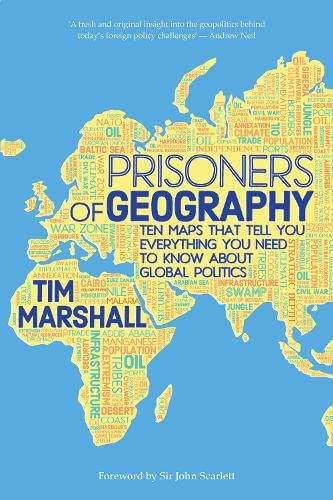Prisoners of Geography
- Spartan Stoic

- Jun 16, 2023
- 3 min read
By Tim Marshall
With most of the media’s attention currently on the war in the Ukraine, it feels an apt time to understand the origins of today’s political landscape. Tim Marshall was diplomatic editor for Sky News and has 25 years of reporting experience. He has penned several successful books on geopolitics, this being the first one.
The premise for this book is that it takes ten maps from across the world and analyses the key relationships there. For example, one focusses on the Middle East, another on India and Pakistan. I really liked the maps that were included: even in the paperback they were produced in a clear and attractive way.
This is of course very much a westernised view of the geopolitics. It usually does a good job of not letting bias creep in by sticking to the facts and the repercussions and expected response or interpretation by the country in question. I did occasionally raise an eyebrow when I felt like potential bias was perhaps creeping in, although I recognise it is difficult to make these interpretations from the perspectives of totally different cultural backgrounds, standings and circumstances.
You could make the argument that President Putin did not have a choice: he could have respected the territorial integrity of Ukraine. But, given that he was dealing with the geographic hand God has dealt Russia, this was never really an option. He would not be the man who ‘lost Crimea’, and with it the only warm water port his country had access to. (Pp.19)
It's...complicated
I found particularly interesting the complex navigation of the wars in the Middle East. Most westerners know there are disputes between Sunni and Shia Muslims, or about Hezbollah and Zionism, but many are likely ignorant of the warring factions with Lebanon or Jordan, Sykes-Picot or the complexities of the various factions and alliances vying for control.

The geography of locations is described and explored very well, such as the implications of the Urals, the Baltic Sea and Baltic countries for Russia, for example. Marshall covers aspects like resources and multi-factionalism adequately too.
Marshall’s writing style is adequate, never really veering into exciting. It is often fairly perfunctory which might be a function of the amount of ground it has to cover. Some of the attempts at humour tended to fall flat. In terms of delivering the information, it definitely does the job and is readable enough.
For readers already familiar with geopolitics some of this will certainly be too basic, not to mention reading it a couple of years after the publishing date. It really is for more of the generalist reader who wants to understand the various tensions, and it does a good job of introducing that. The analysis is often all too brief before moving onto another country, faction or geographical phenomenon though.
It’s worth noting that the sequel, The power of geography, appears to follow a similar format, again looking at ten maps, and that the more recent version could well be the better one to go with – although at the time of writing I have not reviewed it yet.
Final score
Interesting in modern times, but not necessarily super deep, it’s simple, succinct and sagacious, taking you through the geopolitics of plenty of areas briefly and with intelligent analysis. I felt like I had a better understanding of several areas, but by no means has my knowledge been made comprehensive. Worth picking up cheap.
7/10



